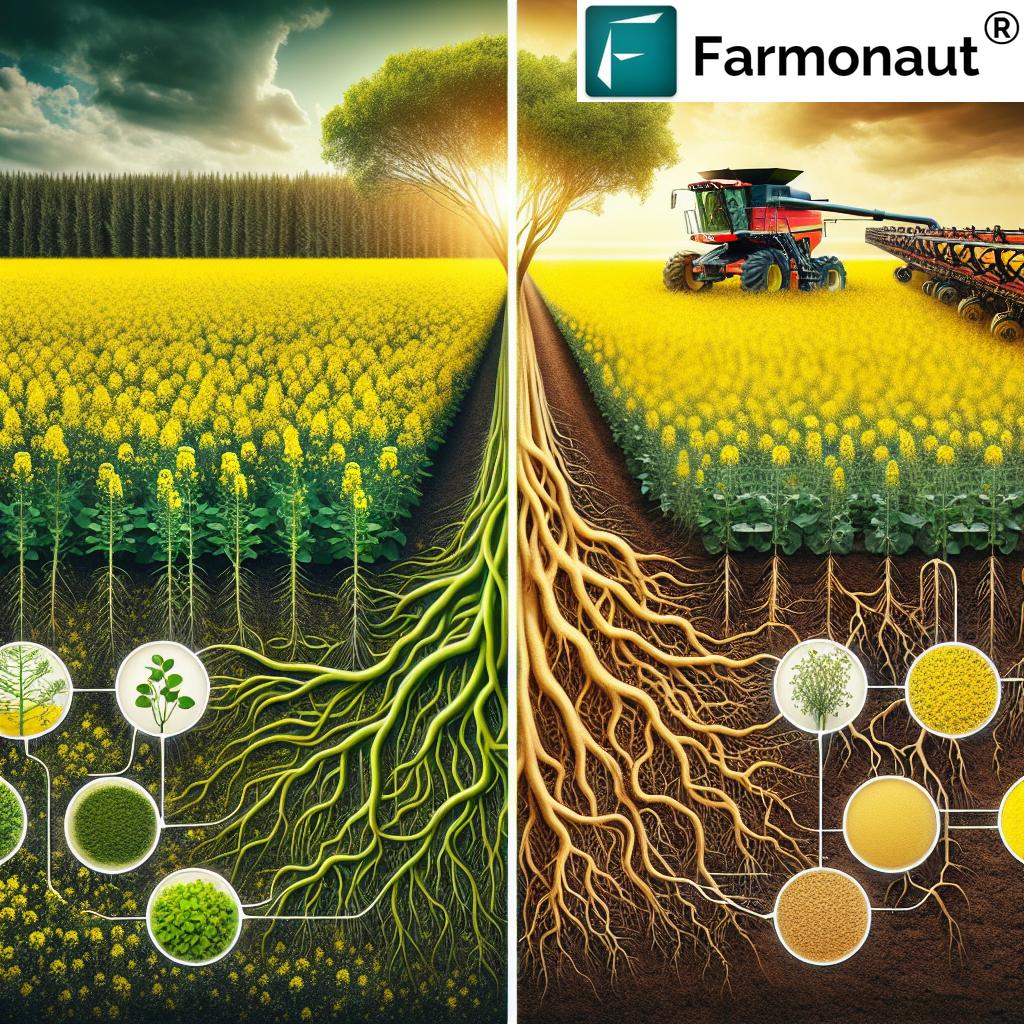Revolutionizing Saskatchewan Agriculture: Cutting-Edge Biological Solutions Boost Crop Yield and Resilience
Saskatoon, Saskatchewan – In the heart of Canada’s prairie province, a quiet revolution is taking place in agriculture. As we step into the future of farming, innovative biological solutions are paving the way for enhanced crop yields, improved resilience, and sustainable practices that promise to transform the agricultural landscape of Saskatchewan and beyond.

“Mycorrhizal inoculants can enhance root networks by up to 50 times, significantly improving nutrient absorption in crops.”
At the forefront of this agricultural revolution is a suite of cutting-edge biological agriculture solutions designed to enhance crop yield potential and promote sustainable farming practices. These innovative products, including advanced biostimulants and mycorrhizal inoculants, are not only improving plant health but also boosting environmental resilience, allowing farmers to maximize the potential of every acre.
The Power of Biological Solutions in Modern Agriculture
As we delve into the world of biological solutions for agriculture, it’s crucial to understand the paradigm shift occurring in farming practices. Traditional methods relying heavily on synthetic chemicals and fertilizers are gradually giving way to more sustainable, biology-based approaches. These innovative solutions offer powerful alternatives to restricted or banned synthetic products, supporting North American farmers in their pursuit of sustainable and high-performance crop production.
Let’s explore the science-backed tools revolutionizing modern agriculture and paving the way for a more resilient and productive farming future.
Next-Generation Biostimulants: Enhancing Crop Performance
One of the most exciting developments in biological agriculture solutions is the advent of next-generation biostimulants. These innovative products are designed to enhance foliar nutrition, improve plant growth, and increase yield potential while mitigating environmental stress.
- EZ-Gro Max: Powered by Bio-APP™ Technology, this advanced biostimulant is tailored for a wide range of crops including alfalfa, barley, canola, corn, oats, potatoes, rye, soybeans, and wheat. It offers broad-spectrum benefits that can significantly boost crop performance.
- EZ-Gro Cyto: This stacked biostimulant package is specifically designed to help crops thrive under unpredictable conditions such as drought, heat, cold, and salinity stress. It’s optimized for various crops, including alfalfa, barley, canola, chickpeas, corn, lentils, oats, peas, rye, soybeans, sunflower, and wheat.
These foliar nutrition products represent a significant leap forward in plant health management, offering farmers powerful tools to enhance crop resilience and productivity.
Mycorrhizal Inoculants: The Underground Revolution
Another groundbreaking development in biological agriculture solutions is the use of highly effective mycorrhizal inoculants. These products, such as Rootella® developed by Groundwork BioAg®, are changing the way we think about plant root systems and nutrient absorption.
Mycorrhizal inoculants work by enhancing root networks through the formation of fungal mycelia. This symbiotic relationship significantly increases plants’ ability to absorb water and nutrients from the soil. The benefits of this technology are numerous:
- Improved plant fertility
- Enhanced environmental resilience
- Increased sustainability of farming practices
- Better nutrient uptake efficiency
- Reduced need for synthetic fertilizers
Built on more than 30 years of research, these highly efficient inoculants are proving to be a game-changer in sustainable agriculture.
The Science Behind Biological Solutions
To truly appreciate the impact of these biological agriculture solutions, it’s essential to understand the science that underpins them. These innovative products leverage the power of natural biological processes to enhance crop performance and resilience.
Biostimulants work by stimulating natural processes to enhance nutrient uptake, nutrient efficiency, tolerance to abiotic stress, and crop quality. They achieve this through various mechanisms:
- Enhancing the activity of soil microorganisms
- Improving root growth and development
- Increasing the production of antioxidant compounds in plants
- Modulating plant hormone levels to improve stress tolerance
Mycorrhizal inoculants, on the other hand, establish a symbiotic relationship between beneficial fungi and plant roots. This relationship offers several advantages:
- Increased surface area for nutrient and water absorption
- Enhanced phosphorus uptake
- Improved soil structure
- Greater resistance to soil-borne pathogens
By harnessing these natural processes, biological solutions offer a sustainable way to boost crop yield and resilience without relying heavily on synthetic inputs.
Comparative Analysis of Biological Agriculture Solutions
| Solution Type | Target Crops | Primary Benefits | Environmental Resilience Factors | Sustainability Impact | Estimated Yield Increase (%) |
|---|---|---|---|---|---|
| Biostimulants (EZ-Gro Max) | Alfalfa, Barley, Canola, Corn, Oats, Potatoes, Rye, Soybeans, Wheat | Enhanced foliar nutrition, Improved plant growth | Mitigates environmental stress | Reduced synthetic fertilizer use | 10-15% |
| Biostimulants (EZ-Gro Cyto) | Alfalfa, Barley, Canola, Chickpeas, Corn, Lentils, Oats, Peas, Rye, Soybeans, Sunflower, Wheat | Stress tolerance, Yield preservation | Drought, Heat, Cold, Salinity resistance | Improved crop resilience | 15-20% |
| Mycorrhizal Inoculants (Rootella®) | Wide range of crops | Enhanced root networks, Improved nutrient absorption | Drought tolerance, Improved nutrient efficiency | Improved soil health, Reduced fertilizer needs | 20-30% |
“Next-generation foliar nutrition products can increase crop yield potential by 15-20% under drought and heat stress conditions.”
Implementing Biological Solutions in Saskatchewan Agriculture
For Saskatchewan farmers looking to implement these innovative biological solutions, it’s important to consider the specific needs of their crops and local environmental conditions. Here are some key steps to successfully integrate these products into existing farming practices:
- Soil Analysis: Conduct a comprehensive soil analysis to understand the current nutrient levels and microbial activity in your fields.
- Crop Selection: Choose the appropriate biological solutions based on your crop types and their specific needs.
- Application Timing: Follow recommended application schedules for maximum efficacy of biostimulants and mycorrhizal inoculants.
- Integrated Approach: Combine biological solutions with other sustainable farming practices for optimal results.
- Monitoring and Adjustment: Regularly monitor crop health and adjust your biological solution strategy as needed.
By carefully implementing these steps, Saskatchewan farmers can harness the full potential of biological agriculture solutions to boost their crop yields and build more resilient farming systems.
The Role of Technology in Modern Agriculture
While biological solutions are revolutionizing crop management, it’s important to note that technology plays a crucial role in modern agriculture as well. Innovative platforms like Farmonaut are complementing these biological approaches by providing farmers with valuable insights and management tools.
Farmonaut’s satellite-based farm management solutions offer real-time crop health monitoring, enabling farmers to make data-driven decisions about when and where to apply biological solutions for maximum effect. Their crop plantation and forest advisory services can help farmers optimize the use of biostimulants and mycorrhizal inoculants based on specific crop needs and environmental conditions.
Environmental Benefits of Biological Agriculture Solutions
The adoption of biological agriculture solutions offers significant environmental benefits, aligning with the growing global focus on sustainable farming practices. These benefits include:
- Reduced Chemical Runoff: By decreasing reliance on synthetic fertilizers and pesticides, biological solutions help minimize chemical runoff into water systems.
- Improved Soil Health: Mycorrhizal inoculants and biostimulants contribute to better soil structure and increased organic matter content.
- Enhanced Biodiversity: These solutions promote a more diverse soil microbiome, supporting overall ecosystem health.
- Lower Carbon Footprint: Reduced need for synthetic inputs often translates to lower energy consumption in agriculture.
For farmers interested in quantifying their environmental impact, Farmonaut offers a carbon footprinting tool. This innovative feature allows agriculturists to measure and manage their carbon emissions, further supporting sustainable farming practices.
Economic Implications for Saskatchewan Farmers
The adoption of biological agriculture solutions presents significant economic opportunities for Saskatchewan farmers:
- Increased Crop Yields: By enhancing plant health and resilience, these solutions can lead to higher yields and improved crop quality.
- Reduced Input Costs: Over time, the use of biological solutions can decrease the need for expensive synthetic fertilizers and pesticides.
- Premium Markets: Crops grown using sustainable practices may command premium prices in certain markets.
- Risk Mitigation: Enhanced crop resilience can provide a buffer against losses due to environmental stresses.
Furthermore, the use of technology like Farmonaut’s crop loan and insurance services can help farmers manage financial risks associated with adopting new agricultural practices.

The Future of Agriculture in Saskatchewan
As we look to the future, it’s clear that biological agriculture solutions will play an increasingly important role in Saskatchewan’s agricultural landscape. The combination of these innovative products with advanced technologies like those offered by Farmonaut is set to usher in a new era of sustainable, high-yield farming.
Key trends to watch include:
- Further research and development of tailored biological solutions for specific crops and conditions
- Integration of AI and machine learning in farm management, as seen in Farmonaut’s advanced advisory systems
- Increased adoption of precision agriculture techniques to optimize the use of biological inputs
- Growing emphasis on regenerative agriculture practices that work in harmony with biological solutions
By embracing these innovations, Saskatchewan farmers can position themselves at the forefront of sustainable agriculture, ensuring the long-term productivity and resilience of their operations.
Conclusion: A New Era for Saskatchewan Agriculture
The introduction of cutting-edge biological solutions marks a significant turning point for agriculture in Saskatchewan. These innovative products, combined with advanced technologies like those offered by Farmonaut, are set to revolutionize farming practices, enhancing crop yields, improving resilience, and promoting sustainability.
As we move forward, the integration of biostimulants, mycorrhizal inoculants, and other biological solutions will be crucial in addressing the challenges of modern agriculture. By embracing these innovations, Saskatchewan farmers can look forward to a future of more productive, sustainable, and resilient farming.
The journey towards this new era of agriculture is just beginning, and the potential benefits for farmers, consumers, and the environment are immense. As we continue to explore and refine these biological solutions, we’re not just improving farming practices – we’re cultivating a more sustainable future for generations to come.
FAQs
- What are biological agriculture solutions?
Biological agriculture solutions are innovative products and techniques that leverage natural biological processes to enhance crop performance, resilience, and sustainability. These include biostimulants, mycorrhizal inoculants, and other bio-based products that work in harmony with plant and soil biology. - How do biostimulants improve crop yield?
Biostimulants enhance crop yield by stimulating natural processes that improve nutrient uptake, increase tolerance to abiotic stress, and enhance overall plant health. This leads to more robust plants that can better withstand environmental challenges and produce higher yields. - What are the benefits of mycorrhizal inoculants?
Mycorrhizal inoculants form symbiotic relationships with plant roots, significantly enhancing the plant’s ability to absorb water and nutrients. This leads to improved plant growth, increased resilience to stress, and enhanced soil health. - Are biological solutions environmentally friendly?
Yes, biological solutions are generally more environmentally friendly than traditional synthetic inputs. They work with natural processes, reduce the need for chemical fertilizers and pesticides, and contribute to improved soil health and biodiversity. - How can Saskatchewan farmers implement these biological solutions?
Saskatchewan farmers can implement biological solutions by first conducting soil analyses, selecting appropriate products for their specific crops and conditions, following recommended application schedules, and integrating these solutions with other sustainable farming practices.
Explore Farmonaut’s Solutions
To complement the use of biological agriculture solutions, consider exploring Farmonaut’s advanced farm management tools:
Earn With Farmonaut: Join our affiliate program
Earn 20% recurring commission with Farmonaut’s affiliate program by sharing your promo code and helping farmers save 10%. Onboard 10 Elite farmers monthly to earn a minimum of $148,000 annually—start now and grow your income!
Farmonaut Subscriptions
By combining cutting-edge biological solutions with Farmonaut’s advanced farm management tools, Saskatchewan farmers can position themselves at the forefront of sustainable, high-yield agriculture. Embrace the future of farming today!






